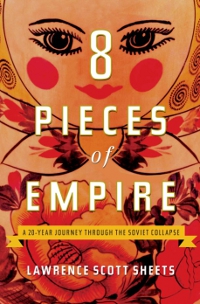27 March 2013
Book review: Eight Pieces of Empire by Lawrence Scott Sheets
 Eight Pieces of Empire — A 20-Year Journey through the Soviet Collapse
Eight Pieces of Empire — A 20-Year Journey through the Soviet Collapse
Lawrence Scott Sheets
Crown Publishers, New York
November 2011
336 pages
ISBN: 978-0-307-39582-5
The publication of Eight Pieces of Empire is good news, because Lawrence Scott Sheets — currently South Caucasus project director for the International Crisis Group — is one of the few Caucasus journalists deployed on the ground during the conflicts of the early nineties. Unlike his close colleague Thomas Goltz, Sheets has decided not to issue separate monographs for each conflict area — Eight Pieces of Empire is Sheet's memoire of the whole of his reporting days.
As the title makes clear, Eight Pieces of Empire is also an overview of the fall-out of the Soviet Union's collapse. The chapters cover the following ground:
- Saint-Petersburg in 1989 to 1991, the coming apart of Soviet society
- Early 1990s Georgia and the war with Abkhazia
- Early 1990s Azerbaijan and Armenia
- The two Chechen wars
- The reburial of the Tsar Nicholas II and his family; the conversion of (former) security service members to Christianity
- Uzbekistan and Afghanistan in late 2001
- Eduard Shevardnadze during the Rose Revolution; a visit to the Ultas of Sakhalin; current day residents of the exclusion zone around Chernobyl; the Beslan hostage crisis
This amounts to seven chapters, and it is not immediately clear why the title speaks of eight pieces (the number of territories covered is actually greater than eight).
It is possible that Sheets considers himself to be the eighth piece. Throughout the book, the number of corpses accumulates steadily, some those of Sheet's friends. Sheets more or less became a war reporter by accident, and in a moving passage at the very end of the last chapter, he expresses the damage inflicted upon himself due to his work, comparing the process to the sustained exposure over a long period to low-level radiation. This is the Faustic pact of war reporting: the most gripping parts of the book are those where Sheets is most deeply involved himself — besieged Sukhum, Beslan, and especially the shocking, surreal and deeply intense chapter on Chechnya.
Eight Pieces of Empire gives neither a full overview of the unraveling of the Soviet Union, nor of Sheets's work — he alludes to several events he covered as a journalist that are not included in the book, like the Orange Revolution and the hostage crisis in Moscow's Dubrovka Theatre. This is a pity for the mere reason that Sheets would surely have had sensible things to say about them. But on the premise that Eight Pieces of Empire should cover precisely those events that Sheets can bring a unique perspective to, the selection of episodes may have been exactly right.
Thus the book includes the final days of the Georgian army in Sukhum before the Abkhaz reconquest in September 1993. Sheets even has the tenacity to return to Sukhum via Russia mere days later, to witness the full-scale looting then underway. In February 2004, he is present during the handover of Zviad Gamsakhurdia's body to a Chechen delegation taking it for reburial in Grozny, catching a last glimpse when the coffin is briefly opened for the purpose of double checking the corpse's identity. Sheets is also in the Presidential Office of Chechnya in November 1994, when TASS reports that Grozny has fallen to the opposition and that the same Presidential office is on fire. He is then connected by phone by Movladi Udugev to President Jokar Dudayev, who is sitting at home, eating borscht prepared by his wife. And Sheets is in Mazar-i-Sharif at the time of the Battle of Qala-i-Jangi in November 2001, the prison uprising with the first American casualty of the Afghan War, which ended in the massacre of a couple of hundred Taliban prisoners.
Originality is also the factor that warrants the inclusion of the more tranquil episodes: Sheets's experience in late-Perestroika Leningrad, his investigation into 'virginity reparation' doctors in early 1990s Georgia, and his visits to the Ultas of Sakhalin, whose traditional livelihood of reindeer herding has become unprofitable after the end of communism, and to the inhabitants of the exclusion zone around Chernobyl, for whom resettlement is a worse fate than exposure to relatively low levels of radiation.
All in all, Eight Pieces of Empire recalls Vladimir Putin's infamous statement that the collapse of the Soviet Union was the greatest geopolitical catastrophe of the 20th Century. It has rightfully been criticised, because, well, WWII and all that. And WWI. Not to mention communist terror the world over. Moreover — popular sentiments in the region notwithstanding — the consensus says that it is a good thing that the Soviet Union no longer exists. But while that in itself may be true, what Eight Pieces of Empire shows is that the collapse of the Soviet Union — the way it played out — really was a tragedy in many different ways.
Eight Pieces of Empire is not a comprehensive historical account of the fall of the Soviet Union, but it does combine a thoroughly interesting and moving personal story with an invaluable insight into the situation on the ground during a number of key moments.